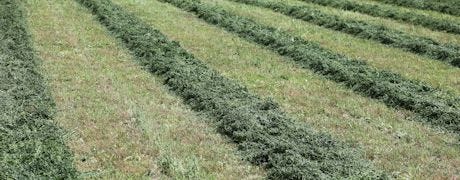February 8, 2013

The popularity of farming enterprises resembles women's fashions. It might be the in-thing to grow fescue for pasture, hay and seed, then someone decides it's more profitable to go to wheat, corn, soybeans, Bermuda grass, ryegrass or turnips.
Sometimes it is hard to keep up with what is the "in thing" says Eldon Cole, a livestock specialist with University of Missouri Extension.
"The good news is that year-in and year-out, one crop that consistently performs well on many farms in southwest Missouri is alfalfa," said Cole. "When you develop a pro and con list for your farm, maybe there are better options than alfalfa, but at least consider it."

"The good news is that year-in and year-out, one crop that consistently performs well on many farms in southwest Missouri is alfalfa," said Cole. "When you develop a pro and con list for your farm, maybe there are better options than alfalfa, but at least consider it."
Alfalfa is often called the queen of forages because of its high quality. In most parts of the country it's a staple for any dairy. High-dollar horse breeders generally like alfalfa hay.
"In this part of Missouri alfalfa hay or pasture complements fescue extremely well. Its high protein content minimizes the purchase of high dollar protein supplements," said Cole.
For example, the 16 alfalfa entries in the 2012 Ozark Empire Fairy Hay Show had an average crude protein level of 20.3 percent. The total digestible nutrients (TDN) value was 66.9 percent and the relative feed value (RFV) was 182.
"This high quality aids beef producers, both cow-calf and stocker programs," said Cole.~~~PAGE_BREAK_HERE~~~
The 2013 University of Missouri Extension projected budgets for various crops lists alfalfa at the top for value over total costs per acre. When put up in small squares, they estimate alfalfa value at $1023 per acre or $980 per acre as balage.
By comparison, the budget for dryland corn is $225 per acre as grain or $550 if chopped for silage.
Alfalfa is not adapted to all soils. Alfalfa does well on well-drained soils but avoid planting it on clay or hard pan soils.
"Alfalfa does require a high, near neutral pH so soil test and apply adequate limestone if you decide to plant it," said Cole. "Fertility must be watched annually since removing five or so tons of hay or haylage on a dry basis can deplete fertility levels."
Alfalfa also requires excellent management for insect and weed control. Cole says if you don't like to bale hay several times a summer, alfalfa may not be for you.
To reap the highest dollar value alfalfa forage, many are turning to small rectangular bales along with balage. It is not designed to be stored outside in big rounds. Barn storage or plastic helps preserve the high quality feed.
"Some argue that alfalfa is too valuable to feed to beef cows," said Cole. "That may be true if a producer overfeeds it. But for adult cows, five to eight pounds per day or twice that much every other day, supplements a cow nicely."
Alfalfa is also extremely good as part of a stocker cattle ration. It can be used as a creep feed for calves effectively. Cole says to keep in mind that the pounds you put on a calf are pretty valuable today compared to past years.
"Not every farm needs to grow alfalfa but some farmers in southwest Missouri need to rethink the merits of it as a cash crop and livestock feed," said Cole.
Source: MU Extension
You May Also Like




